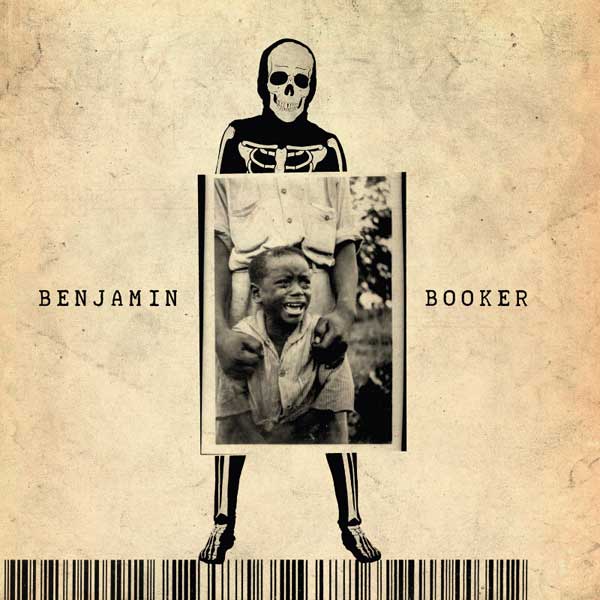For a first timer, making an album and all of the performances, press appearances, and marketing strategies that process entails must seem like starting a journey into the unknown. Benjamin Booker, a twenty-five-year-old singer-songwriter from Tampa by way of New Orleans, seems to agree. The opening line of the first song “Violent Shiver” off of his debut self-titled album reads: “Where I’m going I’ll never know.” But even though the final destination may be undetermined, the rest of the album proves that Booker is comfortable in the unknown, and welcomes anything new he picks up in his travels. In the twelve tracks on his album, Benjamin Booker navigates a variety of musical styles and lyrical themes while still making fantastic music that is very much his own.
No matter how far into a different style of music Booker goes during a song, you can always tell that rock music is his “home.” According to this interview, he was born and raised in Tampa where he was surrounded by peers playing and listening to punk music. He began playing guitar when he was fourteen, starting out by learning to play songs he was familiar with. It wasn’t until he moved to New Orleans in 2012 that he became exposed to the city’s rich musical history and diversity, and that’s when everything started to really click. That’s why for every song like the blues shuffle “Chippewa” or the gospel tune “Spoon Out My Eyeballs,” there is a rocker like fast-paced and anthemic “Old Harts” or the rocker “Violent Shiver,” which begins with a Chuck Berry-like guitar lick.
Along with the different styles Booker traverses on his album, he also jumps between three different central themes. The first is travel, or a journey. The opener and first single released for the record, “Violent Shiver,” is a good example. With its references to crossing mighty rivers, and the chorus repeating the phrase “we found a way,” it’s clear this song is being sung by or about a traveler of some sort.
The track “Have You Seen My Son?” is an autobiographical song about him leaving home and his relationship with religion. The chorus sung from the perspective of his mother, who is troubled by the prospect of him leaving and also not seeing religion as vital as she does. Eventually, after reaching New Orleans, he starts to understand at least to some degree what his mother was talking about.
“Have you seen my son,
he’s lost in the world somewhere,
I pray for him everyday,
but I know he ain’t seen your ways.”
An interesting note about this song is that it is preceded on the album by the track “Wicked Waters” in which a man, stuck in what I assume are metaphorical chains, is looking for a new beginning. He eventually finds hope when he learns that he is going to be a father. He looks forward to teaching his son to avoid the mistakes he made, and wants to “raise him to be wild!” It’s not clear whether this is a prequel to “Have You Seen My Son?” and the point of view is from Booker’s own father, or if this is just an engaging story from a very good songwriter.
The second theme that I picked up on was that of disillusionment with the system or society. Punk music, of which Booker is a fan, has always had an element of social commentary, as have folk and blues. While he’s not as explicit as The Clash or What’s Going On, he doesn’t need to be. Music is subjective, and Benjamin Booker uses that to his advantage on this album. For instance, the song “Kids Never Growing Older,” is vaguely biblical, maybe about death, but it can also be read as being a commentary on the plight of our generation, specifically this line in the chorus: “shame of the nation, kids never growing older.”
In “Slow Coming,” on the other hand, it is clear that Booker is lamenting how our culture’s attitudes aren’t advancing as fast as our technology. You can hear his sense of exasperation as he wails “honestly, how can I be bothered now?” and goes on to mention that “even though our parents fought to be equal” the state still decides what true love is, and that foreigners and people of color have less opportunity. The song specifically mentions same sex marriage and immigration or xenophobia, but the same can be applied to every other area of injustice.
“Even though computers are taking up my time,
even though there’s satellites roaming through space,
even if my phone predicts the weather,
it still can never be.
The future is slow coming.”
The final theme that is heavily referenced on the album is death. When you see that skeleton on the album cover, it shouldn’t be a surprise that the majority of the songs are either about death or reference it in some way or another. The two songs that this applies to the most are “Happy Homes” and “By The Evening.” “Happy Homes” revolves around a young girl who has passed. Booker’s narrator expresses regret and wonders what’s the point of a happy home if a tragedy like that can happen. “By The Evening,” the album’s closer, is a ballad sung from the point of view of someone who is dying. It’s actually pretty brilliantly framed as a person getting ready to start a new journey, as it opens up with Booker singing “right about now I am feeling like packing up my things and leaving.” It’s a perfect ending track because (allow me to get corny for a second) every life’s journey has to come to an end someday. The music appropriately starts out somber and acoustic, but ends loud and triumphant, and although it sounds nothing like one of those famous New Orleans jazz funeral parades, it is very much in the same spirit.
These are all heavy and sometimes dreary things to deal with, but the album sounds quite the opposite. Benjamin Booker and his band play with a ton of energy and life. Booker is a more than capable guitarist; his playing is cunningly sloppy and can go from jangling to squealing in a moment’s notice. He sings with the voice of a bluesman twice his age, and he can convey all the emotions needed to make his lyrics really effective. The rest of his band is great too, particularly the drummer, whose punk energy is an attraction in and of itself. With this musical arsenal combined with those lyrics and themes, Benjamin Booker makes for an impressive debut album.
To end on a personal note, I’ve been excited to review this album for a long time. I was interning at ATO Records when Booker was signed to the label, and I got to meet him once at ATO and once after a show. He reminded me a bit of myself, so I can’t help but root for him. We look similar, not just because we are both black–he seriously looks like we could be related, he and I have similar ways of speaking and acting, we’re very close in age, and he makes music that I like, so it’s interesting to see his success and where he’s going. Of course one big difference is that he has a really good, big album out and is getting national media attention, but hey, he’s about five months older than me, who knows what can happen in that amount of time. Anyway, while you’re holding your breath for me to release an album five months from now, make sure to check out Benjamin Booker.
Benjamin Booker’s self-titled LP is available now at your local record store or online.



